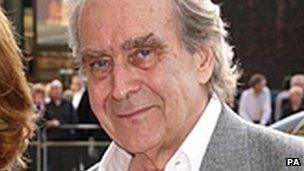Sunday Times acting editor apologises for cartoon
- Published

Gerald Scarfe has apologised for the timing of publication
Sunday Times acting editor Martin Ivens has apologised for a Gerald Scarfe cartoon which prompted complaints of anti-Semitism.
A statement by several Jewish groups said he met community representatives to discuss the cartoon.
"On behalf of the paper I'd like to apologise unreservedly for the offence we clearly caused. This was a terrible mistake," Mr Ivens said.
Mr Scarfe has apologised for the timing of the publication.
The cartoon depicts Israeli PM Benjamin Netanyahu building a brick wall containing the blood and limbs of Palestinians.
It was captioned: "Israeli elections. Will cementing peace continue?"
Mr Ivens said: "You will know that the Sunday Times abhors anti-Semitism and would never set out to cause offence to the Jewish people - or any other ethnic or religious group. That was not the intention last Sunday.
"Everyone knows that Gerald Scarfe is consistently brutal and bloody in his depictions, but last weekend - by his own admission - he crossed a line."
The apology was welcomed by the chairman of the Jewish Leadership Council, Mick Davis.
"We have voiced our concern in response to the strength of the feeling from all sections of the Jewish Community.
"I appreciate the urgency and respect with which the Sunday Times have treated Jewish communal concerns and now look forward to constructively moving on from this affair."
Mr Scarfe has also apologised for the timing of publication.
On his website, external, he said: "First of all I am not, and never have been, anti-Semitic.
"This drawing was a criticism of Netanyahu, and not of the Jewish people: there was no slight whatsoever intended against them.
I was, however, stupidly completely unaware that it would be printed on Holocaust Day, and I apologise for the very unfortunate timing."
At the meeting with Mr Ivens were members of the Board of Deputies of British Jews, the Britain Israel Communications and Research Centre, the Community Security Trust and the Jewish Leadership Council.
Vivian Wineman, president of the Board of Deputies of British Jews, said: "The meeting showed a unified and effective community and we were gratified to see the positive response from the Sunday Times to our community's concerns."
Jewish community leaders said that Jewish people and others reacted to the cartoon "with a visceral disgust that is unprecedented in recent years.
"This was due to the gratuitous and offensive nature of the image, made worse by its use of blood and its being published by Britain's leading Sunday newspaper on Holocaust Memorial Day."
They emphasised that blood "has a long and ugly tradition within the history of anti-Semitism, premised upon the notorious medieval Blood Libel, with Jews being alleged to steal the blood of others for religious purposes."
News International chairman Rupert Murdoch earlier apologised.
Mr Murdoch wrote in a tweet, external: "Gerald Scarfe has never reflected the opinions of the Sunday Times. Nevertheless, we owe major apology for grotesque, offensive cartoon."
Chief Rabbi Lord Sacks said it had "caused immense pain to the Jewish community in the UK and around the world".
"Whatever the intention, the danger of such images is that they reinforce a great slander of our time: that Jews, victims of the Holocaust, are now perpetrators of a similar crime against the Palestinians," he said in a statement, external.
But writing in liberal Israeli newspaper Haaretz, journalist Anshel Pfeffer said the cartoon was "not anti-Semitic by any standard".
Mr Pfeffer said it neither identified its subject as Jewish nor used Holocaust imagery, writing: "Netanyahu's depiction is grossly offensive and unfair, but that is only par for the course for any politician when Scarfe is at his drawing-board."
He also dismissed suggestions of "blood libel" that had focused on the drawing's "blood-red cement".
"This is not what a blood libel looks like," he wrote. "Well, of course it's blood, but is anyone seriously demanding that no cartoon reference to Israeli or Jewish figures can contain a red fluid?"
- Published29 January 2013
- Published29 January 2013